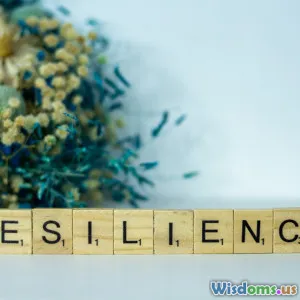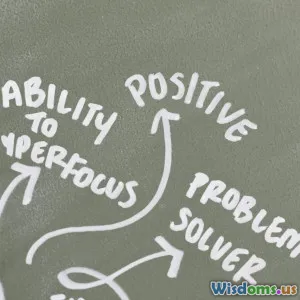
Seven Daily Habits That Strengthen Your Resilience Fast
9 min read Discover seven powerful daily habits that rapidly build resilience, enabling you to face challenges with confidence and ease. (0 Reviews)
Seven Daily Habits That Strengthen Your Resilience Fast
Resilience—the ability to bounce back from adversity—is more than just a buzzword; it’s a vital skill that empowers us to navigate challenges, recover from setbacks, and even thrive in uncertainty. But how do some people seem to rebound quickly, while others get stuck in stress or despair? The answer lies in specific daily habits that cultivate resilience. The best part? These practices are accessible to everyone and can be integrated into your routine swiftly to foster emotional strength and mental toughness.
In this deeply insightful guide, we’ll explore seven actionable daily habits scientifically proven to strengthen your resilience fast. Whether you’re facing work pressures, personal loss, or global instability, these habits can transform your response to stress.
1. Embrace Mindful Reflection
At the core of resilience is self-awareness: understanding your thoughts, emotions, and reactions. Mindful reflection acts like a mental reset button, helping you stay present and focused despite distractions.
Why It Works
Studies, such as those published in the Journal of Positive Psychology (2018), show that mindfulness practices reduce cortisol—the stress hormone—and improve emotional regulation. By observing your feelings without judgment, you prevent reactive behaviors and instead respond thoughtfully.
How to Practice
Dedicate 10 minutes daily to mindful reflection through meditation, deep breathing, or journaling. For example, spend a few moments writing about daily stressors and your emotional responses. This habit cultivates clarity and emotional balance, turning overwhelming situations into manageable challenges.
Real-world insight: Professional athlete Simone Biles credits mindfulness as essential in managing performance anxiety and staying resilient under Olympic pressure.
2. Cultivate a Gratitude Routine
Gratitude is a simple but powerful tool for rewiring the brain’s focus from deficits to abundance. This shifts mindset towards optimism, a key predictor of resilience.
Scientific Evidence
A landmark study from the University of California, Davis found that individuals who maintained gratitude journals experienced lower levels of depression and greater life satisfaction.
Implementation Tips
Each morning or before bed, list three things you're thankful for. They can be as basic as a warm cup of coffee or as profound as a supportive friend. Over time, this habit enhances your ability to find positives even in adversity, bolstering mental fortitude.
Example: During the COVID-19 pandemic, daily gratitude became a coping tool for many, helping them appreciate small joys amid disruption.
3. Prioritize Physical Activity
The mind-body connection is undeniable. Physical exercise not only boosts physical health but also combats anxiety and depression, foundational barriers to resilience.
Research Insights
According to the American Psychological Association, aerobic exercise releases endorphins and neurochemicals like dopamine and serotonin that elevate mood and improve cognitive function.
Making It Daily
Aim for 20-30 minutes of moderate exercise most days. This could be brisk walking, yoga, or cycling. The key is consistency rather than intensity. Incorporate movement into daily life—take stairs, stretch during breaks—to reduce stress and build stamina.
Real-life story: Many mental health professionals report that regular exercise helped them build emotional endurance during strenuous times.
4. Foster Social Connections
Humans are wired for connection. Social support acts like a psychological buffer, easing the impact of adversity and promoting resilience.
Evidence-Based Benefit
A study by Harvard’s Center on Aging revealed that strong social ties contribute to longevity and reduce risk of mental health conditions.
Practical Steps
Connect intentionally with friends, family, or colleagues every day. Even brief conversations or shared activities nurture belonging and validation. In challenging moments, having a trusted person to talk to can be lifesaving.
Insight: During crises like natural disasters, communities with stronger social bonds recover faster and report less trauma.
5. Set Small, Achievable Goals
Resilience grows when we regularly experience success—or progress towards it—even in tiny doses. Setting small, clear goals reinforces self-efficacy.
The Science Behind It
Albert Bandura’s research highlights the role of perceived self-efficacy in resiliency. Achieving micro-goals builds confidence to tackle larger problems.
How-To
Break down overwhelming tasks into simple, manageable actions. Celebrate even minor victories. For example, if job hunting, a small goal could be updating your resume or sending one application daily.
Example: Renowned author J.K. Rowling reportedly wrote row by row daily, gradually completing Harry Potter despite personal hardships.
6. Practice Positive Self-Talk
Your internal dialogue profoundly influences your mental resilience. Negative self-talk undermines confidence and magnifies stress, whereas positive affirmations bolster coping mechanisms.
Psychological Basis
Cognitive-behavioral therapy emphasizes reframing negative thoughts. Neuroscientific studies show that neural pathways strengthen with habitual positive thinking.
Daily Integration
Catch self-critical thoughts and challenge them with constructive alternatives. Example: Instead of "I can't handle this," remind yourself, "I am capable and working through this step by step."
Real-world application: Elite performers and leaders often credit positive self-talk as a mental tool that helped them succeed under pressure.
7. Maintain Healthy Sleep Hygiene
Never underestimate the power of sleep. Quality rest is vital for emotional regulation, memory consolidation, and stress recovery.
Why It Matters
Sleep deprivation increases irritability, reduces coping ability, and impairs judgment—eroding resilience rapidly.
Tips for Better Sleep
Create a regular sleep schedule, minimize screen time before bed, and develop a calming nighttime routine. Aim for 7-9 hours per night to optimize mental resilience.
Science says: According to the National Sleep Foundation, well-rested individuals demonstrate enhanced problem-solving skills and emotional stability.
Conclusion: Resilience Is a Habit, Not a Trait
The fast-paced and uncertain nature of modern life demands that we be resilient—not just occasionally, but consistently. The good news is anyone can strengthen resilience through intentional daily habits. Mindful reflection, gratitude, exercise, social connection, goal-setting, positive self-talk, and quality sleep form a powerful toolkit.
Start small by integrating one or two habits, then build steadily. Over weeks, you’ll notice a fundamental shift: higher stress tolerance, greater optimism, and an empowered outlook during challenges. Remember the words of neuroscientist Rick Hanson, “What you practice grows stronger.” Practice these resilience habits daily—and watch your inner strength thrive rapidly.
References
- Journal of Positive Psychology, 2018: Effects of Mindfulness on Cortisol Levels
- University of California, Davis Study on Gratitude and Depression
- American Psychological Association on Exercise and Mental Health
- Harvard Center on Aging: Social Connections and Longevity
- Albert Bandura’s Self-Efficacy Research
- National Sleep Foundation Recommendations
- Rick Hanson, Ph.D., author of "Hardwiring Happiness"
- Simone Biles’ Mindfulness Interviews
Empower your resilience today—the habits you adopt now will define how you rise tomorrow.
Rate the Post
User Reviews
Popular Posts




















